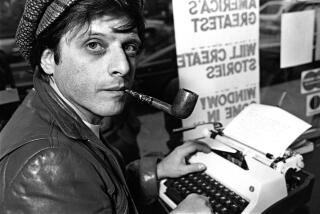Books’ Big Night: No TV, No Stars (and Not Too Many Readers)
Tonight, at the Marriott Marquis Hotel in Manhattan, the National Book Awards will be presented at a black-tie ceremony. For anyone unfamiliar with the event, just think of a literary Oscars -- without the TV coverage or popular appeal.
The National Book Awards are one of the United States’ most prestigious literary prizes, but in a nation where, according to the National Endowment for the Arts, less than 50% of adults still read even one work of “literature” (defined as any novel, story, play or poem) in a year, that doesn’t mean as much as it once did.
For this reason, perhaps, the proceedings have taken on a certain desperation, culminating in an extended dust-up over the five fiction nominees (Sarah Shun-Lien Bynum’s “Madeleine Is Sleeping,” Christine Schutt’s “Florida,” Joan Silber’s “Ideas of Heaven,” Lily Tuck’s “The News From Paraguay” and Kate Walbert’s “Our Kind”), which have been decried by critics, publishers and booksellers as representing far too narrow a slice of literary life.
The National Book Awards are no stranger to controversy; just last year, Yale University English professor Harold Bloom called the decision to honor Stephen King with a Medal for Distinguished Contribution to American Letters “egregious,” a slap in the face to literature.
This new dispute, however, is somewhat different. No one is saying that the fiction nominees are too commercial, but that they are not commercial enough. Only one, “Our Kind,” has sold more than 2,000 copies, which is a paltry figure even for literary fiction, and all five are the sort of slim, interior -- some might say precious -- works that fly under the radar in a blockbuster culture such as ours. Add to this the fact that the five nominated writers are all women and all live in New York City, and you’ve got a tempest in a teapot, the type of small-stakes squabble at which the book business excels.
Publishing insiders, of course, see the issue differently, in much more consequential terms. To them, this is a matter of survival in a market that seems tenuous at best. The National Book Awards, after all, are considered a showcase; winning, or even receiving a nomination, can translate into thousands of sales. Why not, then, tilt toward more visible works of fiction and, in the process, raise the profile of the industry and the prize?
“We are completely closing ourselves off from the culture at large,” Larry Kirschbaum, chairman of Time Warner Book Group, told the New York Times. “We are supporting our demise.”
One of the most common complaints is that, in a year when well-known literary heavyweights such as Russell Banks, Cynthia Ozick and Philip Roth published serious novels, none were nominated for the award. Such an argument sounds good, but, in fact, it’s specious, suggesting that an author’s stature is as important as his or her work. I’ve read the three novels in question, and though all have vivid moments, their absence doesn’t seem a grievous oversight.
Another charge is that the five nominees are too slight, too incremental -- in other words, not mainstream enough. Here, at least, the issue is merit, after a fashion; it’s what I call the big-book argument, that to win a prize an author has to be ambitious, if not with length then with ideas. Certainly, some recent winners -- Jonathan Franzen’s “The Corrections” and Shirley Hazzard’s “The Great Fire” -- illustrate this thesis; go back a few years, though, and you’ll find less dominating choices, such as “Charming Billy” by Alice McDermott or Charles Frazier’s “Cold Mountain.” The point is that literary awards are a subjective business, in which a panel of judges wrestles with its own tastes -- individually and collectively -- to come up with a representative award.
It’s an impossible task for a lot of reasons, beginning with the number of books to be considered; the National Book Awards fiction jury looked at 272 titles, all submitted by their publishers -- a mere fraction of the more than 8,000 volumes of fiction published in the U.S. each year. Faced with this, the five judges have little choice but to make broad surveys of the landscape and advocate for works that speak to them.
Do they make mistakes? Absolutely. When I was on the board of the National Book Critics Circle between 1994 and 2002, we failed to nominate one major novel because no one had read it. Only rarely -- two or three times in eight years -- was there unanimous support for a title, and, at times, our debates grew so contentious that people nearly came to blows. We did not worry about being in touch with the larger culture; this has never been a prize jury’s concern. And that, I think, is as it should be.
Did this year’s fiction jury use its nominations to draw attention to worthy, if lesser known, books and writers, as some have argued? It’s possible, I suppose; I’ve done the same myself. But in a culture in which reading is increasingly tangential, it’s hard to find fault with that. In fact, it seems like the least the jury could do.
More to Read
Sign up for our Book Club newsletter
Get the latest news, events and more from the Los Angeles Times Book Club, and help us get L.A. reading and talking.
You may occasionally receive promotional content from the Los Angeles Times.








